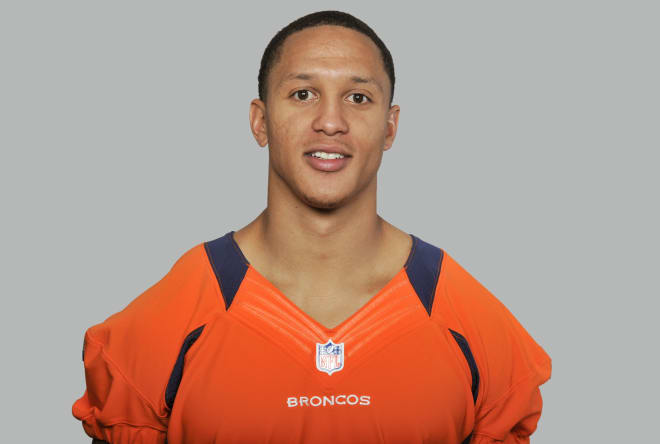Former FSU star Carter excited about coaching career despite JU decision
Coaching cornerbacks at Jacksonville University was not necessarily Tony Carter's dream job. That doesn't mean Tuesday's shocking news -- that the university was disbanding its football program -- was easy to handle.
Carter, a former Florida State star who went on to play eight years in the NFL, had just completed his first season as a full-time college coach after being hired by his hometown university in April.
On Monday, he was returning from a recruiting trip to Naples when the coaching staff received word about a staff meeting to be held Tuesday morning.
CYBER MONDAY EXTENDED: ** Get 50% off a new Warchant subscription **

That's when JU athletics director Alex Ricker-Gilbert broke the news: Jacksonville University was shuttering its football program after 22 seasons to devote money and resources to other initiatives.
Immediately after the staff meeting, the players were told the news.
"It was a complete shock to the coaching staff and the players," Carter said. "We were under the impression that we were moving forward with the next things on our calendar -- recruiting and then spring football. I feel really bad for the players. I understand why the university would be doing it, but it puts the players in a tough situation. A lot of them came here because of football, and now they can't do it here anymore."
Carter, of course, also went to JU because of football.
After wrapping up his NFL career in 2016, the former Seminole standout spent the next couple of years interning with a number of college and NFL coaches, including Kirby Smart at Georgia, Jeremy Pruitt at Tennessee and Dan Mullen at Mississippi State. He also got to learn from Jon Gruden's staff with the Oakland Raiders as part of the NFL's Bill Walsh Diversity Coaching Fellowship program.
Then this past spring, he accepted his first full-time coaching gig at JU, an FCS program in his hometown.
While things certainly didn't go the way he hoped -- the Dolphins won only three games this season -- it only served to reinforce his belief that his future lies in coaching.
"I really enjoyed it," Carter said. "It was definitely fulfilling and a great learning experience for me. Being a part of a football team is always amazing. And I learned so much by being at this level -- not just the Xs and Os but also everything that goes into running a program -- because of the limited resources. When you work for an FCS program, it really makes you appreciate what I had as a player and student at Florida State. It really opened my eyes."
While some former players fall into coaching when they finally hang up their cleats, this actually has been Carter's goal for as long as he can remember.
It's why he hung on every word from legendary head coach Bobby Bowden in team meetings. Why he loved the incredibly demanding approach of defensive coordinator Mickey Andrews. And why he spent as much time as he could learning from young graduate assistants on the staff like Kirby Smart and Terrell Buckley.
"I'm a thief of all the information I've gotten from all those guys," the 33-year-old Carter said, adding that he still reaches out regularly to several of his mentors. "I'm not reinventing the wheel, but I do have my own personality. And I definitely tap into Coach Bowden's spirituality and faith, and Coach Andrews' intensity and attention to detail. And Kirby was the guy who recruited me and taught me how to play cornerback when I was in high school.
"So I take part of every coach I've ever played for. I take anything I can and incorporate it in my own way."
Like Smart, who is in his fourth year as head coach at Georgia, Carter is not afraid to work his way up from the bottom.
Smart took a G.A. position at Florida State in 2002 after serving as a defensive coordinator at Division-II Valdosta State, specifically so he could learn from Andrews and Bowden and also build his networking base. He parlayed that into a full-time assistant's job on Nick Saban's staff at LSU two years later.
Carter, meanwhile, has played at the highest levels of college football and the NFL, yet was willing to coach players who had very little chance of ever achieving that type of success.
"It's not about where you start, it's about where you're going," Carter said. "What I did as a player has nothing to do with me as a coach. I've learned to put my ego and my playing experience aside, and put all of my time and effort and energy into coaching these young men.
"Whether it's middle school football or the Pro Bowl, it's still the same game. And the most important thing about football is impacting young men and women through the sport."
With that in mind, Carter is devoting most of his time right now to helping his players find new colleges to continue their playing careers. JU has pledged to honor the athletes' scholarships going forward, but if they want to stay in the sport, they'll need to look elsewhere.
"A lot of these guys could have gone to other schools, but they wanted to play football, so that's why they chose Jacksonville," Carter said. "That's my main focus right now, is to find a home for the guys who want to keep playing. That's what's important to the kids and their parents, and we made a commitment to them. So I want them to have an opportunity to continue their careers as student-athletes."
Carter also is working to figure out his next destination. And while he isn't going to be picky about where he goes, he also isn't going to be bashful about letting Florida State's next coaching staff know he'd love to help his alma mater in some capacity.
"I'm pursuing new opportunities as we speak," he said. "And I'll go ahead and put it out there that Florida State is a program I would love to be a part of. The way I see it is if you don't say it, they won't know. So I'm saying it: I want to be a part of the Florida State program and the university in any way, shape or fashion. That has always been in my heart, and it would be a dream come true."
The ultimate dream, Carter said, is being a head football coach.
He has always loved the sport. He learned at JU that he really enjoys recruiting and is good at it. And he has a passion for helping young people.
"I always knew coaching was part of my future," Carter said. "I've always been a student of the game -- not only in style of play but in leadership. All the coaches I ever had, including John Fox and Jack Del Rio in the NFL, said, 'You're gonna be a great coach some day.' So I'm very excited about my future as a coach. And the ultimate goal is to be a head coach.
"I've always set my goals as high as possible, and it's been a dream since I was young. Obviously you have to put in the work to get there, but I want to be in position to impact young men."
And the setback this week -- seeing his program shut down after just eight months on the job -- has done nothing to dampen his spirits or aspirations.
Shortly after Tuesday's team meeting, Carter took to social media to express his gratitude for the opportunity to be a full-time college coach.
"One thing I live by is it's not about what happens to you, but how your respond," Carter said. "I've dealt with adversity my entire life. I was an undersized guy when I was being recruited out of high school. Then I was undrafted out of college but lasted as long as I did in the league. I only was able to do those things through God and how I responded.
"You have two choices at those moments: You can hang your head or you can work to make something good come from it. For now, the way I'm doing that is by helping these kids find new schools. There's no question that my faith is strong and I'm moving forward. Wherever God takes me, that's where I'm supposed to be."
----------------------------------------------------
Talk about this story with Florida State football fans in the Tribal Council
